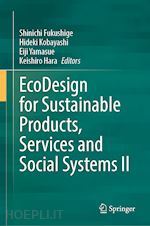
Questo prodotto usufruisce delle SPEDIZIONI GRATIS
selezionando l'opzione Corriere Veloce in fase di ordine.
Pagabile anche con Carta della cultura giovani e del merito, 18App Bonus Cultura e Carta del Docente
This 2-volume book highlights cutting-edge ecodesign research and covers broad areas ranging from individual product and service design to social system design. It includes business and policy design, circular production, life cycle design and management, digitalization for sustainable manufacturing, user behavior and health, ecodesign of social infrastructure, sustainability education, sustainability indicators, and energy system design. Featuring selected papers presented at EcoDesign 2021: 12th International Symposium on Environmentally Conscious Design and Inverse Manufacturing, it also includes diverse, interdisciplinary approaches to foster ecodesign research and activities. In the context of Sustainable Development Goals (SDGs), in particular SDG 12 (Responsible Consumption and Production), it addresses design innovations for sustainable value creation, considering technological developments, legislation, and consumer lifestyles. Further, the book discusses the conceptof circular economy, which aims to develop circular business models for resource efficient society by taking advantage of digital technologies including artificial intelligence, internet of things, digital twin, data analysis and simulation.
Written by experts from academia and industry, Volume 2 focuses on the sustainability assessment of product lifecycle, waste management, material circularity and energy efficiency, food and agriculture, user behavior and health, and transportation. The methods, tools, and practices described are useful for readers to facilitate value creation for sustainability.
Shinichi Fukushige is a professor at the Department of Industrial and Management Systems Engineering, School of Creative Science and Engineering, Waseda University. After obtaining his doctor’s degree in precision machinery engineering from the University of Tokyo in 2006, he began work at Osaka University as an assistant professor. Since 2014, he served as an associate professor at the Department of Mechanical Engineering, Graduate School of Engineering, Osaka University before moving to Waseda University in 2020. His current research interests include product life cycle design and management, simulation of circular economy, environmentally conscious product and service design, and circular business design.
Hideki Kobayash is a professor at the Department of Mechanical Engineering, Graduate School of Engineering, Osaka University. He graduated from Hokkaido University, and earned PhD in Design Engineering from the University of Tokyo. Prior to the currentposition, he was engaged to Toshiba, as a senior manager of Corporate Research & Development Center in the area of environmental and sustainable technologies. Membership in the Japan Society of Mechanical Engineer (JSME), Japan Society for Precision Engineering (JSPE), etc. Co-director of Italian Design Summer School (IDSS) in Bologna University. His major research interests include sustainable system design and management, sustainable consumption and production (SCP), sustainable manufacturing.
Eiji Yamasue is a Professor at the Department of Mechanical Engineering in the College of Science and Engineering, Ritsumeikan University, Japan. He completed his PhD from Tokyo Institute of Technology in 2000. His research interests include industrial ecology, energy and resources, etc. He has authored several books and has published 120 papers with over 1800 citations to his credit.
Keishiro Hara is a professor and the co-director of Center for Future Innovation (CFi), Graduate School of Engineering, Osaka University. He is also consulting fellow at Research Institute for Economy, Trade and Industry (RIETI). He is elected the Fellow of The Engineering Academy of Japan. He was appointed as senior officer for technology policy and strategy at Manufacturing Industries Bureau, Ministry of Economy, Trade and Industry (METI), the government of Japan, between October 2016 and March 2018. His primary research interests include Future Design and Sustainability Science. Prof. Hara holds Ph.D. in Environmental Studies and Bachelor of Engineering, both from the University of Tokyo.











Il sito utilizza cookie ed altri strumenti di tracciamento che raccolgono informazioni dal dispositivo dell’utente. Oltre ai cookie tecnici ed analitici aggregati, strettamente necessari per il funzionamento di questo sito web, previo consenso dell’utente possono essere installati cookie di profilazione e marketing e cookie dei social media. Cliccando su “Accetto tutti i cookie” saranno attivate tutte le categorie di cookie. Per accettare solo deterninate categorie di cookie, cliccare invece su “Impostazioni cookie”. Chiudendo il banner o continuando a navigare saranno installati solo cookie tecnici. Per maggiori dettagli, consultare la Cookie Policy.